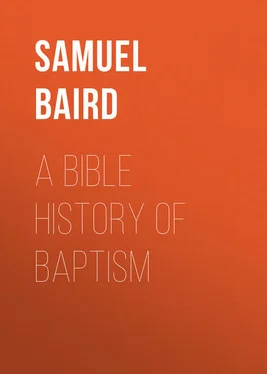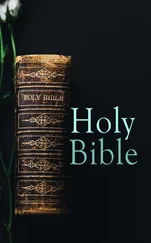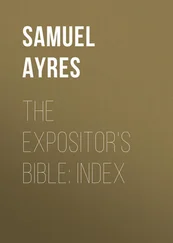Samuel Baird - A Bible History of Baptism
Здесь есть возможность читать онлайн «Samuel Baird - A Bible History of Baptism» — ознакомительный отрывок электронной книги совершенно бесплатно, а после прочтения отрывка купить полную версию. В некоторых случаях можно слушать аудио, скачать через торрент в формате fb2 и присутствует краткое содержание. Жанр: foreign_antique, foreign_prose, на английском языке. Описание произведения, (предисловие) а так же отзывы посетителей доступны на портале библиотеки ЛибКат.
- Название:A Bible History of Baptism
- Автор:
- Жанр:
- Год:неизвестен
- ISBN:нет данных
- Рейтинг книги:5 / 5. Голосов: 1
-
Избранное:Добавить в избранное
- Отзывы:
-
Ваша оценка:
- 100
- 1
- 2
- 3
- 4
- 5
A Bible History of Baptism: краткое содержание, описание и аннотация
Предлагаем к чтению аннотацию, описание, краткое содержание или предисловие (зависит от того, что написал сам автор книги «A Bible History of Baptism»). Если вы не нашли необходимую информацию о книге — напишите в комментариях, мы постараемся отыскать её.
A Bible History of Baptism — читать онлайн ознакомительный отрывок
Ниже представлен текст книги, разбитый по страницам. Система сохранения места последней прочитанной страницы, позволяет с удобством читать онлайн бесплатно книгу «A Bible History of Baptism», без необходимости каждый раз заново искать на чём Вы остановились. Поставьте закладку, и сможете в любой момент перейти на страницу, на которой закончили чтение.
Интервал:
Закладка:
Respecting the ritual system, there are two propositions which are believed to be demonstrable, but are here presented without argument. The first is, that these rites were not dark forms, veiling rather than disclosing a new revelation; but were inscriptions in luminous characters, setting forth the doctrines of a faith well understood by the patriarchs and fathers from the beginning, and from them transmitted and known to Israel. Second. The ritual forms in which the gospel was clothed in the Levitical system were far more suitable for the purposes of popular instruction and world-wide dissemination than would have been any conceivable exposition of it in writing. The art of writing was in its infancy. A written gospel would have been, even to Israel, a sealed book; how much more to all other people! The history and laws were put in writing and kept at the sanctuary for the direction of the priests and magistrates in the performance of their duties, the administration of justice, and the instruction of Israel. But the gospel, for the people, was clothed in forms which required no interpreter, which meant the same in every language under heaven, and which were calculated, by their appeals to the imagination through the eye and the senses, to stamp themselves indelibly upon the memory and the affections. Thus were they eminently adapted to arrest the attention and impress the minds of strangers, and of the young, for whom especially they were designed. (Ex. xii, 26; xiii, 14; Deut. vi, 20; Josh. iv, 6, 21; 1 Kings viii, 41, 42.)
The fact is of an importance which entitles it to distinct and emphatic mention, that the Aaronic priesthood and the ritual law were no part of the constitution of the church, as it was established by the covenant. They were not in existence when the covenant was made, but were ordinances afterward given to the church, as already existent and organized. They were bestowed as means of fulfilling her witnessing office, means adapted to the times and circumstances of Israel, but subject to be modified, as they were in the temple system, or to be wholly suspended or set aside, without impairing the constitution of the church or the completeness and efficiency of its organization. Not only thus did the covenant precede the ritual law and the priesthood, but when, forty years afterward, the covenant was renewed, and the parties to it were enumerated in detail, the priests were altogether ignored. (Deut. xxix, 10-12.) They were in no wise essential to it.
Section XI. — The Terms of Membership in the Church of Israel
With some slight circumstantial differences, having reference to the difference in the office of the church under the two dispensations, the conditions of membership were essentially the same as propounded at Sinai and as prescribed under the gospel. While the spiritual blessings of the covenant were from the beginning conditioned upon true faith and loving obedience, the privilege of membership in the visible church was at Sinai bestowed upon those, with their households, who made credible profession of these graces, and upon them only. On “the day of the assembly,” all the people professed to take God for their God, and to devote themselves to him as his believing and obedient people. And as on the days of Pentecost, so on this occasion, the profession was accepted, and their admission was sealed with baptism; although doubtless, in both cases, there were false professors included with the true. With certain exceptions, ordained for special reasons (Deut. xxiii, 1-8), the conditions of membership were the same for the Gentile world as for Israel. The law was explicit and most emphatic on this point. “One ordinance shall be both for you of the congregation and also for the stranger that sojourneth with you, an ordinance forever in your generations: as ye are, so shall the stranger be before the Lord. One law and one manner shall be for you and for the stranger that sojourneth with you.” – Num. xv, 14-16, and 29; and see ix, 14; xix, 10; Ex. xii, 43-49; Deut. xxxi, 12; Josh. viii, 33, etc.
For eliminating unworthy members, the means provided in the Sinai ordinances were as abundant as those now enjoyed by the church, and would seem to have been as well adapted to the effectual securing of the end proposed. They come under three heads. (1.) Certain offenses were visited with the penalty of death or of utter separation from the communion of Israel. (Ex. xxxi, 14; Num. ix, 13, etc.) (2.) The expenses incident to a faithful performance of the duties required of members of the church of Israel were large and continual. Firstfruits, firstlings, and tithes, trespass offerings, sin offerings, freewill offerings, and other oblations, made up an aggregate which can not have fallen short of one-fifth of all the income of Israel, and probably went far beyond that amount. The law provided none but moral means for enforcing these requirements; and numerous facts in the history of Israel show that by many they were entirely neglected. (Neh. xiii, 10-13; Mal. iii, 8-10.) Those who thus withheld what belonged to the Lord were self-excluded from the fellowship of the covenant society, and were “cut off from the congregation ( ekklēsia from the church ) of the Lord.” (3.) The irksome and humiliating nature of the regulations concerning uncleanness and purifying were very efficient means of separating between the believing and the profane. As we shall presently see, occasions of uncleanness were of almost daily occurrence, in every house. These required a conscientious watchfulness and assiduity, in guarding against defilement, and in using the appointed rites of purifying, which often involved the interruption and expense of journeys to the sanctuary and offerings there.
The communion of the church of Israel thus consisted of those only, with their families, who added to the obligations of a public profession of faith, a fidelity to all the requirements of the law, its moral precepts, its ritual observances, its tithes and offerings, its rites of purifying and its annual feasts. In a word, the account given of Zacharias and Elizabeth describes the character required, in order to fellowship in the church of Israel: “Righteous before God, walking in all the commandments and ordinances of the Lord blameless.” – Luke i, 6. Such, and such only, were the clean , to whom the privileges of Israel’s communion belonged. To them they were certified by the seal of baptism.
Section XII. — Circumcision and Baptism
It is commonly assumed that baptism has come into the place and office of circumcision. This I conceive to be a mistaken view, which involves the whole subject in confusion. Circumcision is the distinctive and peculiar seal of the Abrahamic covenant. While it is true, that in that covenant, as relating to the terms of salvation, all believers were accounted as seed of Abraham, and heirs of the promises, it is equally true that, by its terms, peculiar blessings unspeakably great were assured to the seed of the patriarch after the flesh. Not only was Christ to come of his flesh; not only was the church to be for fifteen centuries constituted of his offspring, but Paul moreover testifies, that richer blessings than they have ever yet enjoyed are to be bestowed on Israel and on the Gentiles through Israel, in the coming future: “If the fall of them be the riches of the world, and the diminishing of them the riches of the Gentiles, how much more their fullness?.. For if the casting away of them be the reconciling of the world, what shall the receiving of them be but life from the dead?” – Rom. xi, 12, 15. This the apostle, futhermore, puts upon the ground that “the gifts and calling of God are without repentance.” – Ib. 29. It was with a view to this relation of the covenant to Abraham’s natural seed, that circumcision was appointed as its seal. Said God: “I will establish my covenant between me and thee and thy seed after thee, in their generations , for an everlasting covenant, to be a God unto thee and to thy seed after thee.” – Gen. xvii, 7. Hence, by circumcision, the token of the covenant was set in the flesh of the males, through whom the descent is counted. So long, therefore, as the church was, for the divine purposes, restricted to the family of Israel, the rite of circumcision was necessary as a prerequisite condition of admission to its privileges, because it was the seal of incorporation by birth or adoption into that family. But this did not constitute admission into the church. The Sinai covenant had its own baptismal seal. The church consisted, not of Israel, the circumcised; but only of the clean of Israel. Of this, baptism was the token and seal. It hence resulted that when the restriction was removed, and the gospel was given to the Gentiles, emancipated from the yoke of circumcision, baptism remained unchanged in place or office, the original and only seal of actual admission to the fellowship and privileges of the church of God. Of all this we shall see more hereafter.
Читать дальшеИнтервал:
Закладка:
Похожие книги на «A Bible History of Baptism»
Представляем Вашему вниманию похожие книги на «A Bible History of Baptism» списком для выбора. Мы отобрали схожую по названию и смыслу литературу в надежде предоставить читателям больше вариантов отыскать новые, интересные, ещё непрочитанные произведения.
Обсуждение, отзывы о книге «A Bible History of Baptism» и просто собственные мнения читателей. Оставьте ваши комментарии, напишите, что Вы думаете о произведении, его смысле или главных героях. Укажите что конкретно понравилось, а что нет, и почему Вы так считаете.












